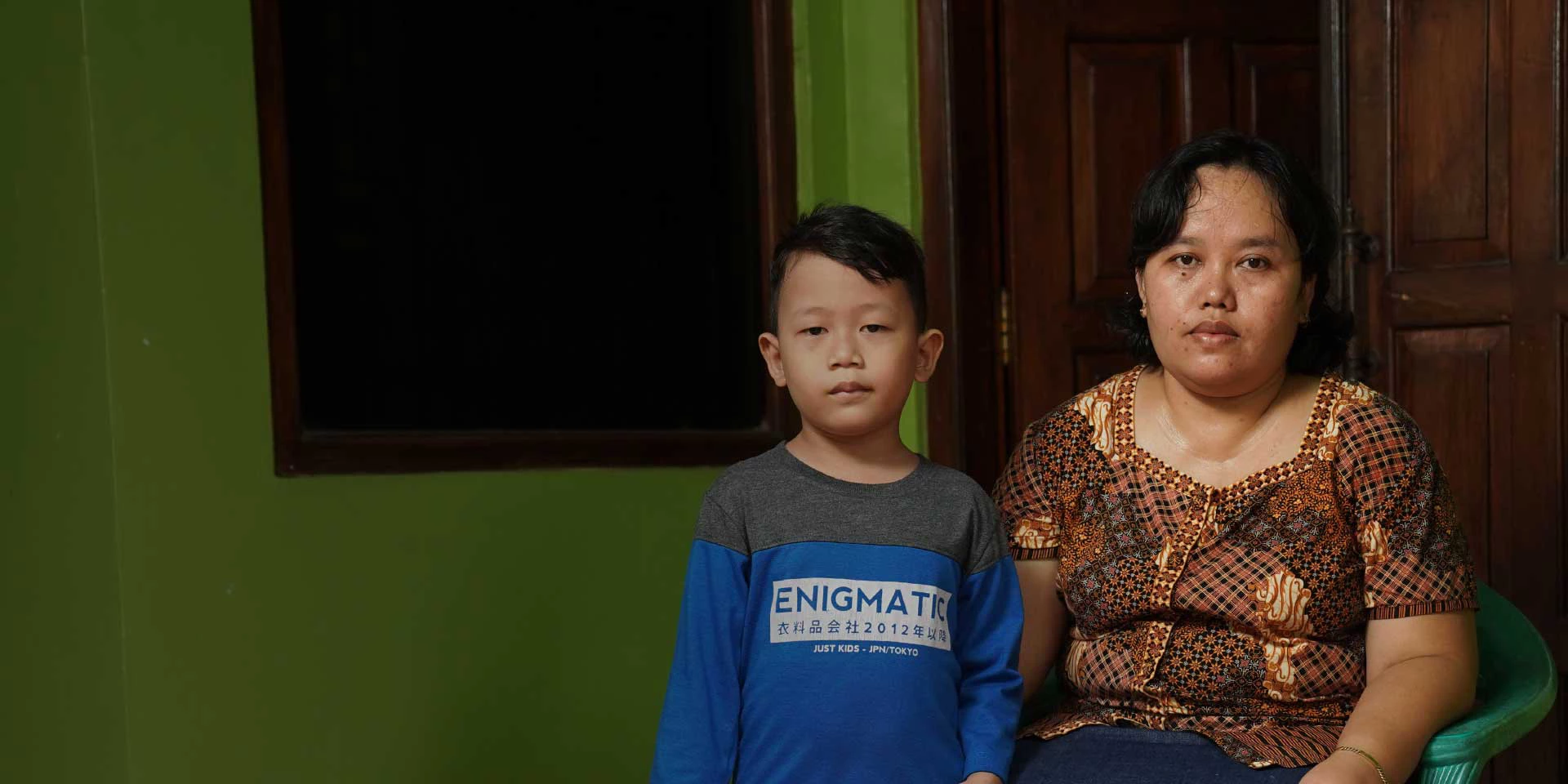By Karlis Salna
Even before the pandemic struck, Lestari’s life had been turned upside down. Her husband Susanto, a motorcycle taxi driver, was killed as he began what started out another ordinary day ferrying people and parcels, and making food deliveries, around Jakarta’s traffic-choked streets.
“It was 9 a.m. when he went out to work. Then, at about 9.30 a.m., I received a call and they told me he was dead, killed in an accident with another motorcycle,” she said.
With two young children to look after, it had always been hard for Lestari and her husband to make ends meet. “At first, I was so confused. I didn’t know what to do,” she says. “But I had to face it, and with all my strength, keep going for my children.”
Lestari was still reeling from the loss of her husband when COVID-19 hit Indonesia a few months later. Now, with the pandemic set to enter its third year and amid the spread of the Omicron wave across the globe, including in Indonesia, Lestari’s story although marked by hardship and heartbreak, is also a tale of resilience.
Things are looking up these days for Lestari and her family— in part thanks to Cleosent Randing, a tech-savvy entrepreneur who is unashamedly proud of his tag as a disrupter. The company he founded, PasarPolis, sells on-demand digital insurance products, including to the millions of Indonesians that would otherwise have little or no protection from the pitfalls of life.

Cleosent Randing is PasarPolis founder and chief executive officer. Photo by Dimas Ardian
For Randing, it’s about more than business and making money. Sure, they are significant motivators, but he insists part of his journey has been about wanting to bridge the gap between the insured and uninsured, or put more bluntly, providing the poor with access to the same kind of safety net as affluent Indonesians.
Along with her two young children, aged five and 13, Lestari now lives with her sister and her family, as well as their 75-year-old mother, after relocating to Sukorejo, a small village in Central Java. With the settlement she received through an insurance policy her husband had taken out through PasarPolis, she was able to open a tiny roadside restaurant, known in Indonesia as a warung, from where she now sells pempek (fishcakes), cilok (tapioca fritters) and martabak telur (egg pancakes).
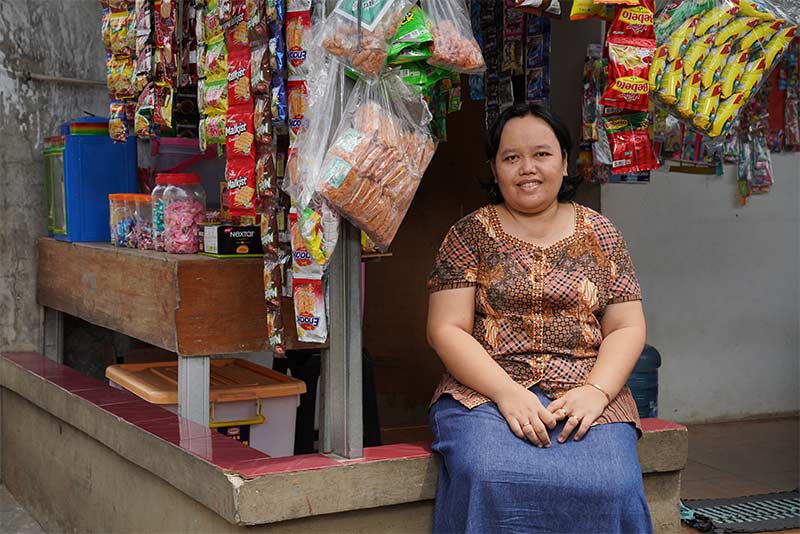
Lestari has used the settlement she received from PasarPolis to open a small roadside restaurant in Sukorejo, Central Java. Photo by Dimas Ardian
Still, it has been far from easy. For Lestari and the almost 28 million Indonesians who get by on less than $33 a month, the constant threat from the virus has made their lives even more precarious.
The pandemic has left an indelible mark on Indonesia, which last year endured a harrowing few months that saw it given the grim mantle as having the worst daily rate of infections in the world according to World Health Organization figures, making it the global epicenter of the pandemic. In August, the number of coronavirus-related deaths eclipsed 100,000 after case numbers surged following the arrival of the Delta variant.
With authorities having stepped up efforts to counter the spread of COVID-19, including acquiring more vaccine doses, Indonesia had appeared to have turned a corner. But with Omicron now spreading, the nation is again in the grip of a major outbreak. On January 29, authorities reported 11,588 new confirmed infections and 17 deaths - the highest daily caseload since that Delta-driven wave in August – with the total number of deaths now at 144,268 from more than 4.3 million infections.
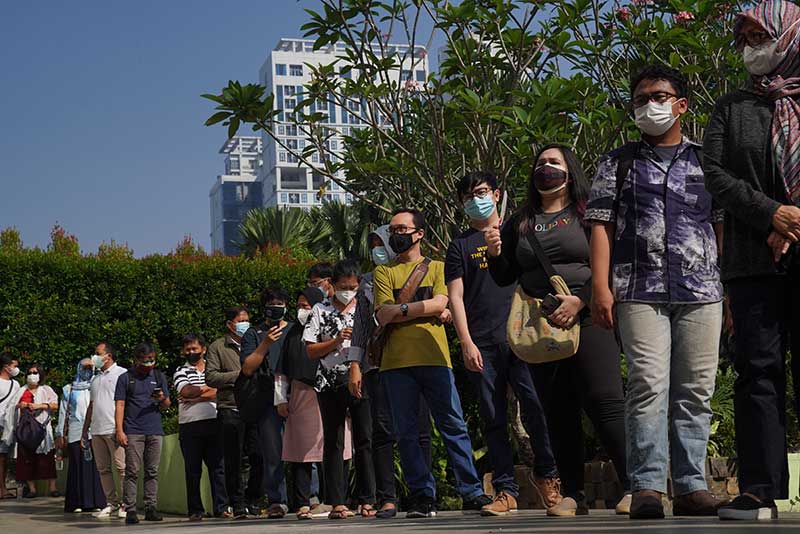
In Banten, Indonesia, people wait in line to receive the COVID-19 vaccine. Photo by Dimas Ardian
It’s not just lives but also livelihoods that COVID-19 has decimated in Indonesia, having moved like a wrecking ball through Southeast Asia’s biggest economy, which shrank 2.1% in 2020, plunging it into its first recession in two decades, before rebounding last year to 3.7%, according to the World Bank Group. The economy is projected expand 5.2% this year, putting it on par with a pace reminiscent of pre-pandemic days.
The pandemic has also underscored that Indonesia, a sprawling archipelago of more than 17,000 islands that would stretch almost from New York to London and one of the most resource-rich countries in the world, is home to huge disparity. It has a labor force the size of the combined populations of the United Kingdom and Italy. But almost 60% (78.1 million) of the 131 million people with jobs are in employed in the informal economy, leaving them exposed more than others to the ravages of the worst global downturn since the Second World War.
But IFC Country Manager for Indonesia, Azam Khan says that amid the more sobering facets of Indonesian life, which have become more pronounced under COVID-19, there are myriad of examples of opportunity, ingenuity and resilience.
“By way of example, Indonesia is already home to more than 100 million smartphones. It is the largest and fastest growing digital economy in Southeast Asia, and on track to be worth $130 billion by 2025,” Khan said. “It’s demographics like that which provide fertile ground for investment, and for innovation, out of which has sprung the likes of PasarPolis.”
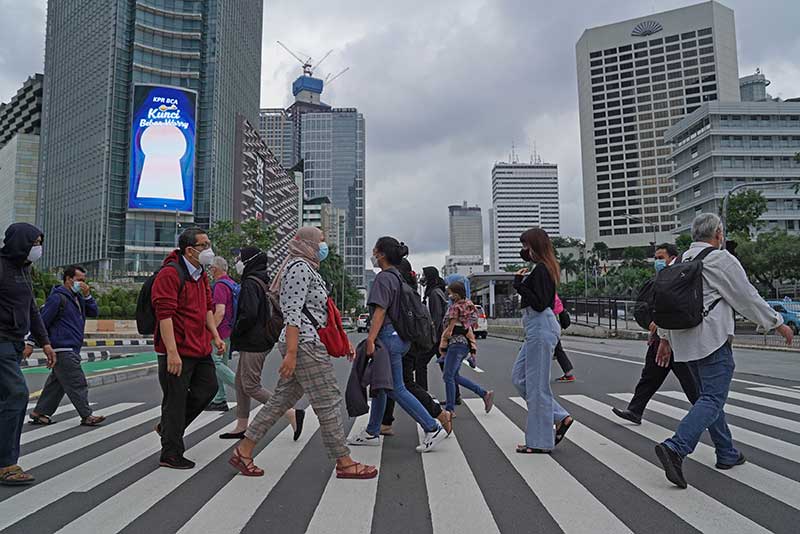
Commuters at a pedestrian crossing in the central business district of Jakarta, Indonesia. Photo by Dimas Ardian
PasarPolis is able to reach customers not served by the traditional insurance sector, including the tens of millions that hover around the poverty line. Figures from the company show that 90 percent of its near 25 million customers — 40 percent of who work in the informal sector — had never purchased insurance policies before coming to PasarPolis.
It’s numbers like these that show that the disruptive nature of the Internet is not only paying dividends on Wall Street but also boosting financial inclusion and lifting people out of poverty in emerging markets such as Indonesia.
Randing said the headline numbers are only part of the story. “We are focused on building a technology-based insurance system and offering next-gen embedded insurance by addressing every customer’s daily needs,” he said.
If that means he’s a disrupter, then so be it, Randing said. But moreover, we are “on a mission to democratize insurance.”
“It must also be a system that makes insurance more widely available and accessible to all levels of society,” he said. “I’ve always envisioned creating a more holistic and easily accessible insurance system to become the bridge for the uninsured.”
There is a long way to go. The current insurance penetration rate at below two percent due to low financial literacy and costly distribution, Randing said. "To date, the insurance gap and unequal distribution of insurance remain major challenges in Indonesia,” he said.
PasarPolis is making huge inroads. Since launching in 2015, the company has issued more than one billion policies. And Randing believes the pandemic can be a catalyst for even more innovation. “Almost every individual as well as businesses across the globe will have to increasingly rely on technology and adapt to new ways of living via digital platforms, he said.
“We see this everywhere from the time we wake up, whether we are working, studying, communicating, purchasing and delivering goods and services, ordering food, travelling or of course accessing information and even entertaining ourselves. It’s all being done at home. It’s just a click or a zoom-away.”
“As a result, during the pandemic, a trend has emerged in that some of our business verticals — health, logistics, auto, and even devices, especially cracked-screen insurance — are seeing increased demand. The period of contagion, self-isolation, and economic uncertainty has and will continue to change the way consumers behave, in many aspects of life, now and for years to come,” he said.
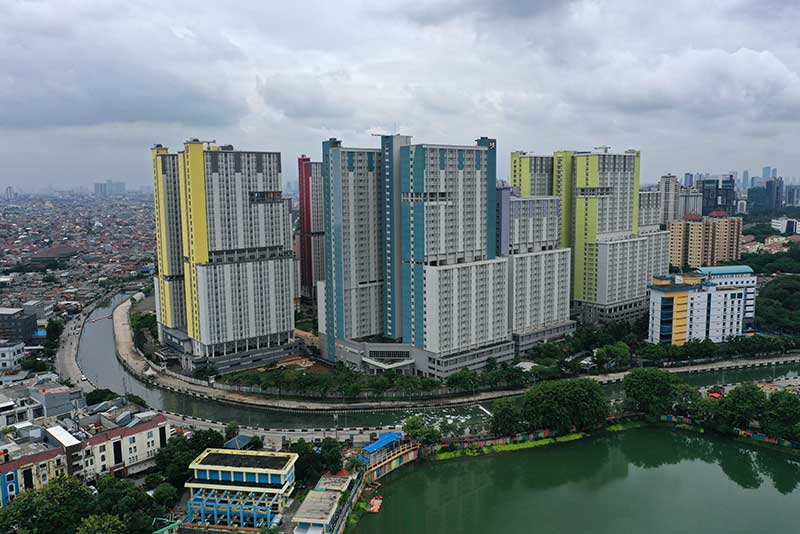
The COVID-19 Emergency Hospital (RSDC) Wisma Atlet Kemayoran in Jakarta, Indonesia. Photo by Dimas Ardian
Around the world, and particularly among already vulnerable populations, COVID-19 brought with it a pandemic of growing inequality.
“We know people in the poorest countries will suffer the most and the longest and Indonesia tragically is now seeing a resurgence of this terrible virus,” said Kim-See Lim, IFC Regional Director for East Asia and the Pacific.
“This has been a sobering experience but one which has also reminded us of the power of innovation and cooperation, and vital role the private sector can play. We see this in the case of PasarPolis which is not only providing a stepping-stone to greater financial inclusion but also as a social safety net,” she said.
Indonesia has emerged as an upper-middle income economy with a young population, rich in renewable and non-renewable resources and politically stable. But it also ranks behind Thailand, China, and Vietnam on the human capital index while learning adjusted years of schooling amount to only eight, hampering productivity. Weak competition policies and regulatory uncertainty hinder private sector growth and despite a massive spend on infrastructure during President Joko Widodo’s two terms in office, the domination of state-owned enterprises and a long period of underinvestment means a significant gap remains. Financial and capital markets are underdeveloped.
These challenges have seen IFC fine-tuning its strategy for Indonesia to focus on infrastructure, capital markets, MSMEs, human capital development and health and education, along with two cross-cutting themes of digitalization and climate. Embedded in the strategy is the understanding of a need to support relief, restructuring, and a resilient recovery.
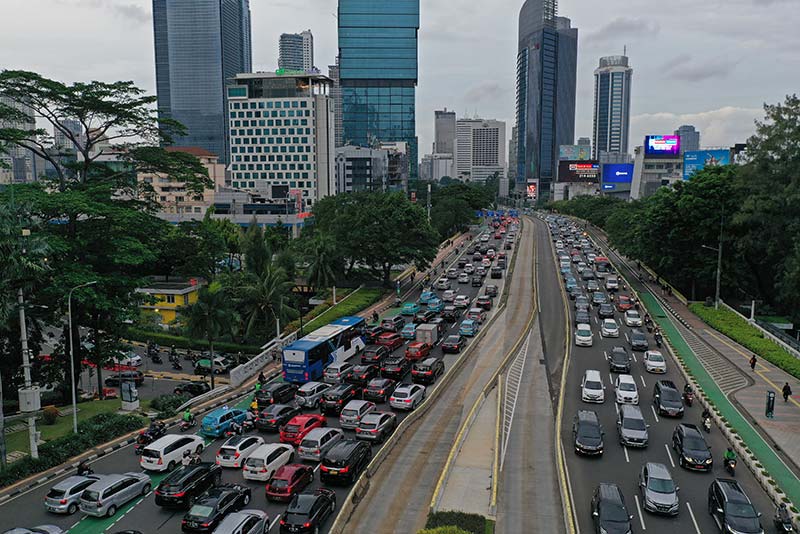
Traffic in the central business district of Jakarta, Indonesia.
Lestari, the restaurant owner, is representative of the Indonesia this strategy is aimed at. Innovation and digitalization — giving her access to insurance — not only helped shield her family from the worst of the pandemic, making her more resilient, but has also given them hope of a brighter financial future.
“The pandemic has made things much harder,” Lestari said. Still, things could also be a lot worse, she said.
Published in February 2022
